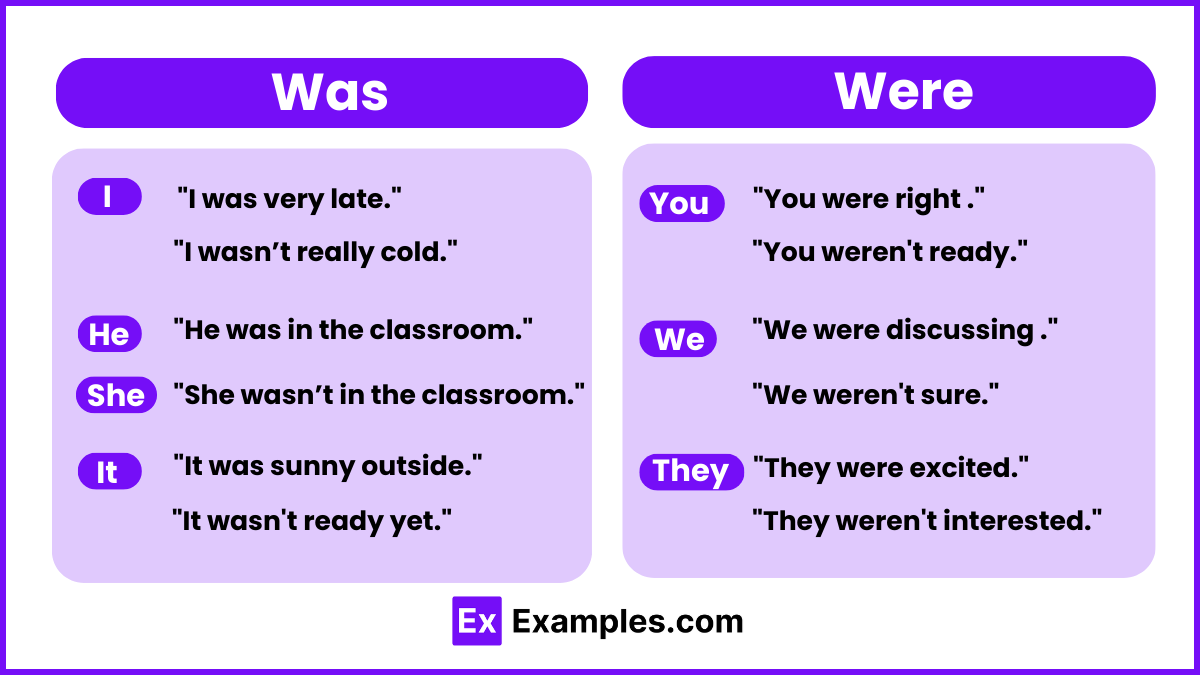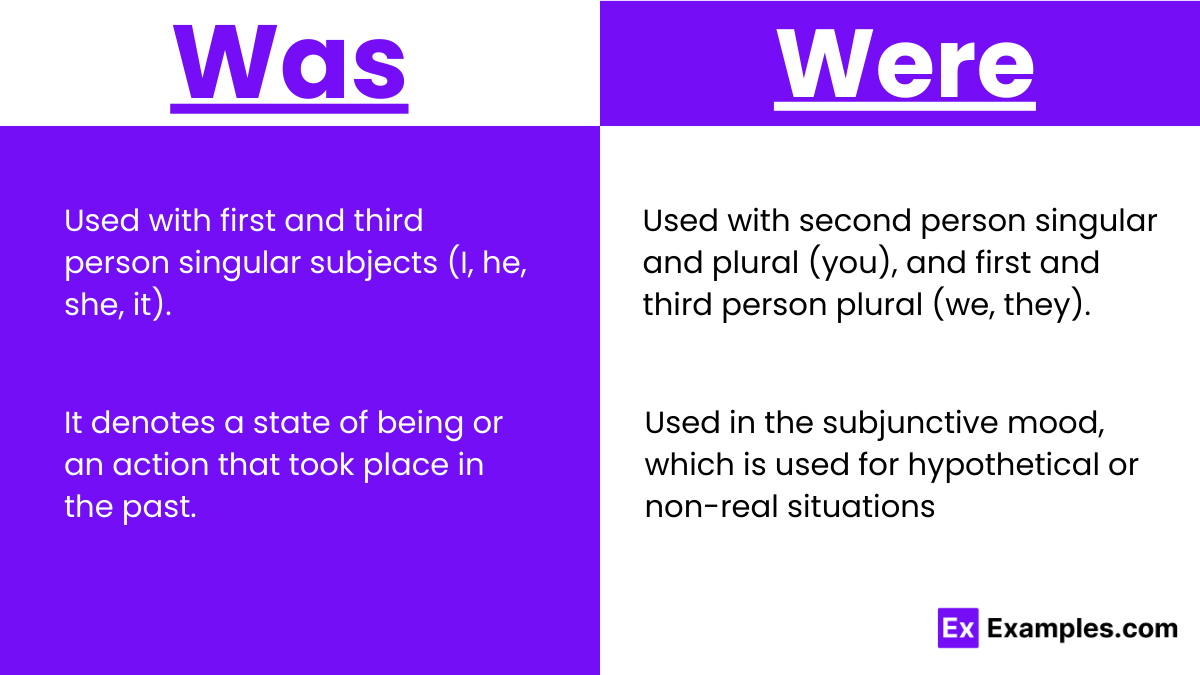Was vs Were – Examples, Differences, Usage
Navigating the intricacies of English grammar can often feel like a daunting journey for students, especially when it comes to correctly employing auxiliary verbs such as ‘was’ and ‘were.’ These two seemingly simple words carry significant weight in sentence construction, and a slight misstep in their usage can lead to glaring grammatical mistakes. This article aims to demystify the nuances between ‘was’ and ‘were,’ offering students a clear roadmap to mastering their application.
Understanding the distinction between these auxiliary verbs is crucial for building a solid foundation in English grammar. By the end of this guide, students will be equipped with the knowledge to use ‘was’ and ‘were’ confidently and correctly, enhancing their overall language proficiency. Join us as we explore the key differences and rules governing the use of ‘was’ and ‘were,’ ensuring your journey through English grammar is both enlightening and error-free.
Was and Were – Meanings
Understanding the distinction between “was” and “were” is fundamental in mastering English grammar. These two words, while both past tense forms of the verb “to be,” serve different purposes based on the subject they accompany, reflecting nuances in number and mood.
- “Was” is used with first and third person singular subjects (I, he, she, it). It denotes a state of being or an action that took place in the past. For example, “I was at the store yesterday,” or “She was happy to see him.”
- “Were” is used with second person singular and plural subjects (you), and first and third person plural subjects (we, they). It is also the form used in the subjunctive mood, which is used for hypothetical or non-real situations, regardless of the subject. For example, “You were late to the meeting,” or “If I were a bird, I could fly.”
The proper use of “was” and “were” is crucial for constructing grammatically correct sentences that accurately convey the intended time frame and mood. This distinction not only aids in clear communication but also enhances the sophistication of one’s writing and speaking in English.
Summary
Understanding the distinction between “was” and “were” is key to mastering English grammar, as both serve as past tense forms of the verb “to be” but are used differently depending on the subject’s number and mood. “Was” is applied to first and third person singular subjects (I, he, she, it) to denote a state of being or action in the past. Conversely, “were” is used for second person singular and plural subjects (you), as well as first and third person plural subjects (we, they), and in subjunctive mood scenarios for hypothetical or unreal situations. Properly using “was” and “were” ensures grammatically correct sentences that accurately reflect the intended time frame and mood, enhancing both the clarity and sophistication of English communication.
Difference Between Was and Were
| Aspect | Was | Were |
|---|---|---|
| Usage | Used with first and third person singular subjects: I, he, she, it. | Used with second person singular and plural subjects: you, and first and third person plural subjects: we, they. |
| Examples | – I was excited about the trip.
– She was the best in her class. |
– You were always there for me.
– They were ready to start. |
| Subjunctive Mood | Not typically used in the subjunctive mood, except in some dialects or historical contexts. | Used in the subjunctive mood for hypothetical or unreal conditions, regardless of the subject. |
| Subjunctive Examples | – (Historical/Subdialect) If I was king, I would change the law. | – If I were king, I would change the law.
– If she were here, she would explain the situation. |
| Function | Indicates a state of being or action in the past relating to singular subjects. | Indicates a state of being or action in the past for plural subjects and hypothetical situations. |
| Key Point | Reflects a factual or actual situation in the past for singular entities. | Often used to express hypothetical situations, wishes, or conditions contrary to fact, as well as past actions. |
Examples of Was and Were

Using “was” and “were” correctly can enhance the clarity and accuracy of your communication. Here are examples to illustrate their proper use in sentences:
Examples of “Was”:
- I was excited to see the new movie.
- He was the only one who knew the answer.
- She was late to class yesterday.
- It was a sunny day last Saturday.
- The cat was sleeping on the sofa.
Examples of “Were”:
- You were supposed to call me!
- We were thinking about going to the beach.
- They were the best team last season.
- You all were invited to the party last week.
- If I were you, I would apologize.
These examples demonstrate how “was” is used with singular subjects to describe past states or actions, while “were” is used with plural subjects and in hypothetical or conditional sentences, regardless of the subject’s number.
When to Use Was and Were

Usage of “Was”:
- Referring to the First and Third Person Singular Subjects in the Past Tense: This includes “I,” “he,” “she,” and “it.” For instance, “I was excited about the trip,” or “He was the winner of the contest.”
- Describing a Past Event or Condition for Singular Subjects: Use “was” to talk about a single event or state in the past. Example: “It was sunny yesterday.”
Usage of “Were”:
- Referring to Second Person Singular and All Plural Subjects in the Past Tense: This applies to “you,” “we,” and “they.” For example, “You were right,” or “They were on vacation last week.”
- In Conditional Sentences, Expressing Hypothetical or Unreal Situations: Regardless of the subject’s number, use “were” for situations that are imagined or contrary to fact. Example: “If I were a king, I would build a huge castle.”
- Describing Past Events or Conditions for Plural Subjects: When talking about more than one subject, “were” is used. Example: “The streets were empty.”
“There Were” or “There Was”?
The choice between “There were” and “There was” depends on the number (singular or plural) of the noun that follows these phrases. This distinction is crucial for maintaining subject-verb agreement in English sentences. Here’s a detailed look at when to use each:
“There Was”
- Use “There was” when referring to a singular noun or an uncountable noun. This phrase sets the stage for mentioning the existence of a single entity or something uncountable in the past tense. For example:
- “There was a cat on the porch.”
- “There was milk in the fridge.”
“There Were”
- Use “There were” when referring to plural nouns. This phrase is used to talk about the existence of multiple entities in the past tense. For example:
- “There were three books on the table.”
- “There were many people at the concert.”
Key Points
- The choice between “there was” and “there were” is directly tied to the noun that follows. If the noun is singular or uncountable, use “there was.” If the noun is plural, use “there were.”
- This rule also applies to questions and negative sentences. For instance, “Was there a problem?” versus “Were there any problems?” and “There was no reason to hurry.” versus “There were no seats left.”
- The context of the sentence dictates the correct form to use, ensuring that the sentence is grammatically correct and conveys the intended meaning accurately.
FAQs
Should I say “I was” or “I were”?
Use “I was” for statements in past tense. “I were” is incorrect in standard situations, but “If I were” is used in hypothetical or subjunctive cases.
Do we say “there was” or “there were”?
“There was” is used for singular or uncountable nouns, and “there were” for plural nouns. The choice depends on the noun’s number following “there.”
Is it “if I were honest” or “if I was honest”?
“If I were honest” is correct for hypothetical situations, expressing something contrary to fact. “If I was honest” is less common and used for past situations that are possible.
Is it “if she were” or “if she was”?
“If she were” is used in hypothetical or subjunctive mood situations, suggesting an unreal condition. “If she was” refers to past situations that could have been true.



